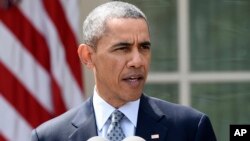Iran and six world powers have agreed to "key parameters" for a preliminary deal involving Tehran's nuclear program, following eight days of talks in Lausanne, Switzerland.
Speaking in a joint statement, European Union foreign policy chief Federica Mogherini and Iran's Foreign Minister Mohammad Javad Zarif said enough progress had been reached to continue the negotiations until a final deadline of June 30.
"Today we have taken a decisive step," Mogherini said. "We have reached solutions on key parameters for a comprehensive future nuclear deal."
U.S. President Barack Obama, speaking from the White House Rose Garden Thursday, said the U.S. has reached a "historic understanding with Iran," and called the agreement "a good deal, a deal that meets our core objective" of keeping Iran from obtaining a nuclear bomb.
Obama said that while the key details will be finalized over the next three months, he outlined the basics of the agreement.
He said the deal reached between Iran and the six world powers would keep Iran from being able to pursue a bomb either using plutonium or enriched uranium, and that it was the best possible defense to Tehran covertly obtaining a nuclear bomb.
Upon news that a framework agreement had been reached, officials in Iran and among the so-called P5+1 group tweeted the news. Zarif tweeted: “Found solutions, ready to start drafting immediately.”
Iranian President Hassan Rouhani made a similar announcement on Twitter and phoned Zarif and chief negotiator Ali Akbar Salehi to thank them for their work.
Details
However, negotiations continued on a dispute over how much of the agreement to make public.
Its details are highly sensitive to both sides, especially Iran, which is worried about signing off on explicit targets to curb its nuclear program in the absence of a final settlement that would see economic sanctions lifted.
A Western official told Reuters the sides had agreed that the comprehensive settlement would require Iran to dilute or ship abroad most of its stocks of enriched uranium, and suspend two-thirds of the 19,000 centrifuges it operates for enrichment. It will be monitored for 10 years.
Different restrictions on Iran's nuclear program would continue for a quarter-century. In return for compliance, international sanctions will be gradually lifted. This is part of a preliminary political understanding reached on Thursday between Tehran and the six, the source said.
Zarif told reporters that once the IAEA verifies that Iran has implemented all the key nuclear-related steps in the agreement, U.S. and EU nuclear-related sanctions would be suspended, calling that action "a major step forward."
Israeli Prime Minister Benjamin Netanyahu demanded that the deal between Iran and world powers “significantly” curb Iran's nuclear program.
Netanyahu put out a statement on his Twitter feed, moments before Iran and international negotiators in Switzerland announced the deal Thursday.
He said: “Any deal must significantly roll back Iran's nuclear capabilities and stop its terrorism and aggression.”
Some material for this report came from Reuters and AP.




